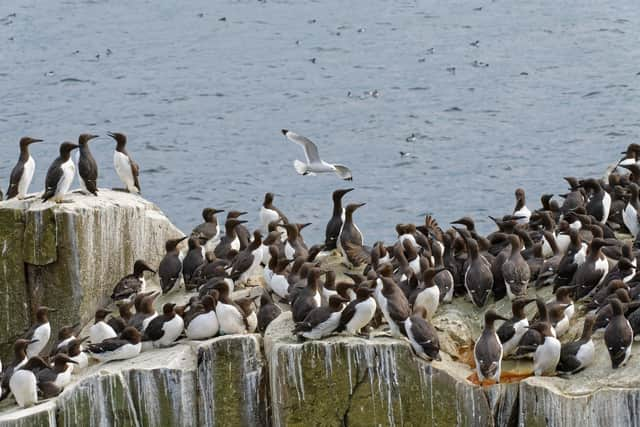Guillemots among birds 'devastated' by outbreak of bird flu, Yorkshire study reveals
Professor Tim Birkhead, from the University of Sheffield, said he has been studying a population of guillemots on Skomer Island, off the Pembrokeshire coast, since 1973 and is now concerned their future is at risk.
He said thousands of guillemots have been killed by the outbreak of highly pathogenic avian influenza (H5N1) and “it looks like things may get worse”.
Advertisement
Hide AdAdvertisement
Hide Ad“Skomer Island is one of the most important seabird sites in the UK – it’s home to a major proportion of the total number of guillemots and other seabirds in the whole of Britain. So to see them being so badly affected is heartbreaking,” he said.


“If avian flu continues to spread, this could turn into one of the biggest disasters to hit the UK’s seabird population.
The ornithologist has also found that climate change has depleted the fish stocks which the guillemots feed on and made extreme weather events, which kill the birds and disrupt breeding seasons, more frequent.
Two major storms in May 2021 resulted in the direct loss of many eggs, which the guillemots lay on cliffs and then defend as a group from predatory gulls and ravens.
Advertisement
Hide AdAdvertisement
Hide AdIt comes after The Scottish Seabird Centre said it found “significant numbers” of dead guillemots along the coastline of the Firth of Forth over the summer and evidence suggests that many starved due to a lack of prey.


“Over the last 50 years I’ve witnessed how climate change is affecting how guillemots live,” said Professor Birkhead.
“Changes to the climate are making it more difficult for them to breed, find food and increasing the number of events that threaten the population’s very existence.
“Mass mortality events, or wrecks, have always occurred but they were once rare and seabirds have evolved to cope with them, but now their increased frequency is very worrying.”
Advertisement
Hide AdAdvertisement
Hide AdHe added: “Guillemots are endlessly fascinating, which is why I have continued to study them for 50 years.
"These birds are also a key component in the marine ecosystem, and to see them battered and knocked back by a succession of man-made (or anthropogenic) agents is hugely depressing.
"Guillemots are our monitors of the quality of the marine environment. They provide a clear signal about what we are doing to the planet.”
Professor Birkhead said his important research is reliant on donations and he needs further support for it to continue.
Advertisement
Hide AdAdvertisement
Hide AdThe Government has said the UK has been dealing with its largest and longest ever outbreak of bird flu since October 2021 and millions of birds have been killed by the disease or culled.
Wild birds migrating to the UK, from northern Russia and eastern Europe over the winter months in search of warmer weather, have been spreading H5N1, which does not spread to humans easily and poses a low risk to poultry products, including eggs.
Earlier this month, The National Trust revealed that more than 7,000 seabirds have died from bird flu at precious colonies across the UK this year.
Signifcant numbers of dead birds were found on the Pembrokeshire coast, Long Nanny in Northumberland, Cemlyn in north Wales and Brownsea in Dorset, as well as the east and north coasts of Northern Ireland.
Advertisement
Hide AdAdvertisement
Hide AdUK chief vet Christine Middlemiss said the outbreak “poses a significant threat to the UK’s wild bird populations” and she is concerned about the impact on breeding populations, particularly seabirds that nest closely in large numbers.
Bird populations in dozens of countries around the world have also been devastated by the disease in recent years, according to the World Organisation for Animal Health (WOAH).
It said 67 countries in five continents reported outbreaks in poultry and wild birds in 2022, with more than 131m domestic poultry lost due to death or culling. Another 14 countries have recorded outbreaks so far this year.
The WOAH also said 10 countries across three continents have seen outbreaks in mammals since 2022 and “there are likely to be more countries where outbreaks have not yet been detected”.